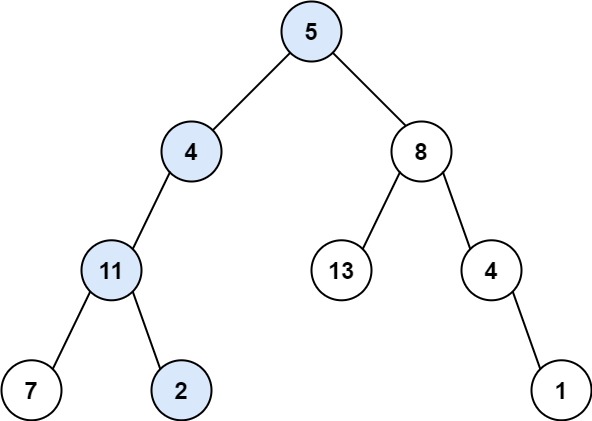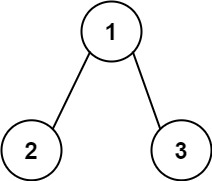[LeetCode] 112. Path Sum
Given the root of a binary tree and an integer targetSum, return true if the tree has a root-to-leaf path such that adding up all the values along the path equals targetSum.
A leaf is a node with no children.
Example 1:

Input: root = [5,4,8,11,null,13,4,7,2,null,null,null,1], targetSum = 22 Output: true
Example 2:

Input: root = [1,2,3], targetSum = 5 Output: false
Example 3:
Input: root = [1,2], targetSum = 0 Output: false
Constraints:
- The number of nodes in the tree is in the range
[0, 5000]. -1000 <= Node.val <= 1000-1000 <= targetSum <= 1000
路径总和。
给你二叉树的根节点 root 和一个表示目标和的整数 targetSum ,判断该树中是否存在 根节点到叶子节点 的路径,这条路径上所有节点值相加等于目标和 targetSum 。
叶子节点 是指没有子节点的节点。
来源:力扣(LeetCode)
链接:https://leetcode-cn.com/problems/path-sum
著作权归领扣网络所有。商业转载请联系官方授权,非商业转载请注明出处。
题意是给一个二叉树和一个数字 sum。求是否有这样一条路径可以使得二叉树从根节点到叶子节点经过的所有的节点值之和等于 sum。此题可以用 BFS 和 DFS 两种做法解决。
DFS/recursive
时间O(n)
空间O(h)
JavaScript实现
1 /** 2 * Definition for a binary tree node. 3 * function TreeNode(val, left, right) { 4 * this.val = (val===undefined ? 0 : val) 5 * this.left = (left===undefined ? null : left) 6 * this.right = (right===undefined ? null : right) 7 * } 8 */ 9 /** 10 * @param {TreeNode} root 11 * @param {number} sum 12 * @return {boolean} 13 */ 14 var hasPathSum = function (root, sum) { 15 if (root === null) { 16 return false; 17 } 18 if (root.left === null && root.right === null) { 19 return sum === root.val; 20 } 21 return ( 22 hasPathSum(root.left, sum - root.val) || 23 hasPathSum(root.right, sum - root.val) 24 ); 25 };
Java实现
1 class Solution { 2 public boolean hasPathSum(TreeNode root, int sum) { 3 if (root == null) { 4 return false; 5 } 6 if (root.left == null && root.right == null) { 7 return sum == root.val; 8 } 9 return hasPathSum(root.left, sum - root.val) || hasPathSum(root.right, sum - root.val); 10 } 11 }
BFS/iterative
用一个 stack 存储遍历到的节点。当加入某个节点的时候,如果这个节点没有孩子节点,需要判断加入这个节点之后的值是否等于 sum;如果这个节点有孩子节点,接着遍历它的孩子节点,将cur.val + cur.left.val (cur.val + cur.right.val)加入stack。
时间O(n)
空间O(n) - n is the number of nodes
JavaScript实现
1 /** 2 * Definition for a binary tree node. 3 * function TreeNode(val, left, right) { 4 * this.val = (val===undefined ? 0 : val) 5 * this.left = (left===undefined ? null : left) 6 * this.right = (right===undefined ? null : right) 7 * } 8 */ 9 /** 10 * @param {TreeNode} root 11 * @param {number} sum 12 * @return {boolean} 13 */ 14 var hasPathSum = function (root, sum) { 15 if (!root) { 16 return false; 17 } 18 let stack = [root]; 19 while (stack.length) { 20 let cur = stack.pop(); 21 if (!cur.left && !cur.right && cur.val === sum) { 22 return true; 23 } 24 if (cur.right) { 25 cur.right.val += cur.val; 26 stack.push(cur.right); 27 } 28 if (cur.left) { 29 cur.left.val += cur.val; 30 stack.push(cur.left); 31 } 32 } 33 return false; 34 };
Java实现
1 class Solution { 2 public boolean hasPathSum(TreeNode root, int sum) { 3 // corner case 4 if (root == null) { 5 return false; 6 } 7 8 // normal case 9 Stack<TreeNode> stack = new Stack<>(); 10 stack.push(root); 11 while (!stack.isEmpty()) { 12 TreeNode cur = stack.pop(); 13 if (cur.left == null && cur.right == null) { 14 if (cur.val == sum) { 15 return true; 16 } 17 } 18 if (cur.right != null) { 19 stack.push(cur.right); 20 cur.right.val += cur.val; 21 } 22 if (cur.left != null) { 23 stack.push(cur.left); 24 cur.left.val += cur.val; 25 } 26 } 27 return false; 28 } 29 }
相关题目





